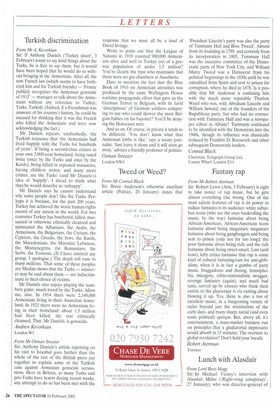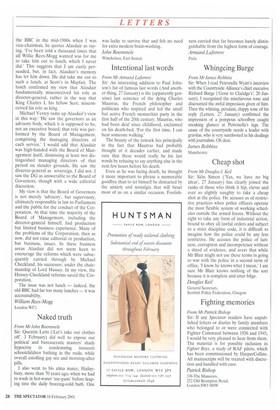Lunch with Alasd air
From Lord Rees-Mogg Sir: In Michael Vestey's interview with Alasdair Milne ('Right-wing conspiracy', 27 January), who was director-general of the BBC in the mid-1980s when I was vice-chairman, he quotes Alasdair as saying, 'I've been told a thousand times that all Willie Rees-Mogg wanted was for me to take him out to lunch, which I never did.' This suggests that I am easily persuaded, but, in fact, Alasdair's memory has let him down. He did take me out to such a lunch, at Scott's in Mayfair. The lunch confirmed my view that Alasdair fundamentally misconceived his role as director-general, rather in the way that King Charles I, his fellow Scot, misconceived his role as king.
Michael Vestey sums up Alasdair's view in this way: 'He saw the governors as an advisory body, which it is supposed to be, not an executive board; that role was performed by the Board of Management, comprising the managing directors of each service.' I would add that Alasdair was high-handed with the Board of Management itself, dismissing at least two distinguished managing directors of that period on slender grounds. He saw the director-general as sovereign. I did not. I saw the DG as answerable to the Board of Governors, though with a wide editorial discretion.
My view is that the Board of Governors is not merely 'advisory', but supervisory, ultimately responsible in law to Parliament and the public for the conduct of the Corporation. At that time the majority of the Board of Management, including the director-general himself, had production but limited business experience. Many of the problems of the Corporation, then as now, did not raise editorial or production, but business, issues. In these business areas Alasdair did not seem keen to encourage the reforms which were subsequently carried through by Michael Checkland, his successor, under the chairmanship of Lord Hussey. In my view, the Hussey-Checkland reforms saved the Corporation.
The issue was not lunch — indeed, the old BBC had far too many lunches — it was accountability.
William Rees-Mogg
London WC1



































































 Previous page
Previous page